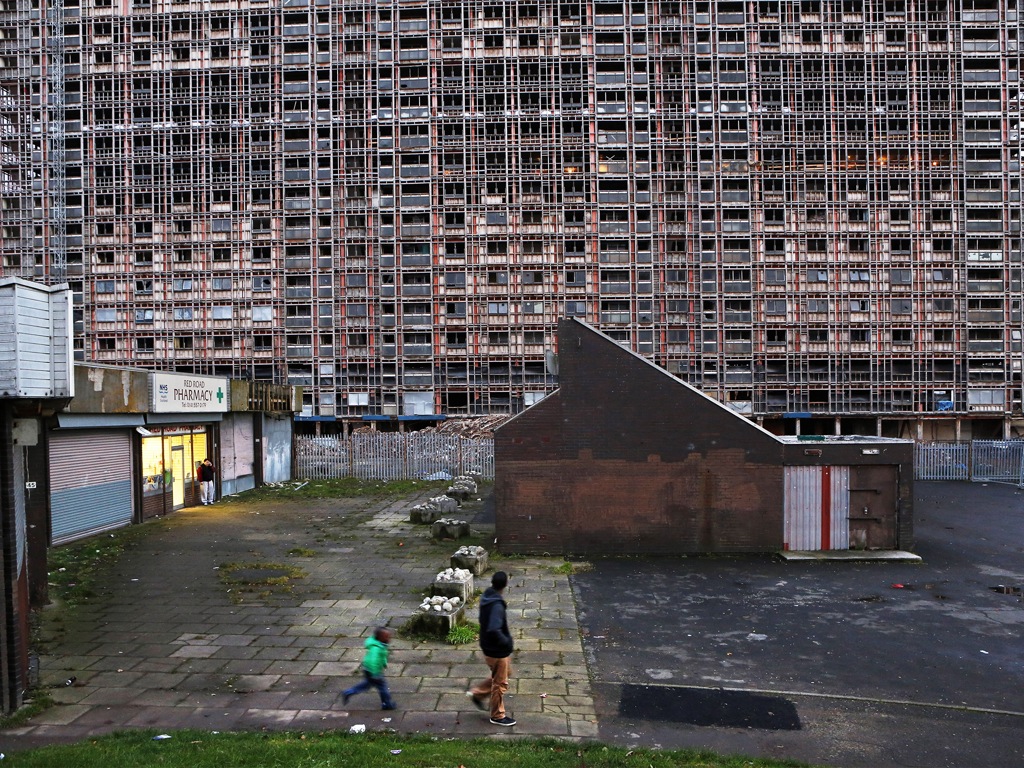
It’s fair to say Glasgow has a history of radicalism. The right to housing has always been at the forefront of that radicalism. As gentrification threatens working class people’s right to the city and exposes us to ever more precarity, we have to see the city’s social cleansing as an aspect of neoliberal capitalism’s recomposition of populations. This article takes a brief look at only some of the aspects of how this class war is being played out in Glasgow.
1. Glasgow has no council houses…
In 2003 Glasgow City Council completed what it called the ‘largest public sector modernisation project in Europe‘. In keeping with neoliberal strategies of ‘modernisation’ this consisted of the transfer of its stock of 81,000 public housing units into the hands of the Glasgow Housing Association (GHA). In effect Glasgow is a city in which all social housing has been privatised. At the same time GHA has branched out into private rent a commerical sector. This situation occurs at the same time that figures reported by Shelter put 5,955 households declared homeless in the period 2012-13 while 1,808 households were living in temporary accommodation.
2. …but the private sector is healthy…
A report from Glasgow City Council states that between 1991 and 2006 the private housing market grew by 50%. In reality this played out as 60,000 homes being transferred from public provision to the private market. The private sector now stands at 60% of the housing market and the same document projects that by 2018 this will rise to 70%. While people struggle to get allocated social housing GHA has branched out into private rent and commerical sector. As the Glasgow Games Monitor report, 19,000 of the 43,000 social properties still operated by GHA are scheduled for demolition or sale. As Karen Paton argues, Glasgow is witnessing a return to the “private landlordism of the early 20th century.”
3. …thanks to a policy of neglect…
For those in social accommodation conditions are often poor, with 161,000 houses failing the Scottish Housing Quality Standards. In 2011 GHA houses were shown to be rife with asbestos, and at a recent housing meeting it was contested by residents that this remains the case. Social housing in Glasgow has been subject to a deliberate neglect that is impossible to hide, as is explored in this short film.
4. …and social cleansing…
Although saved from becoming spectacle, the much talked about demolition of the Red Road flats is still going ahead. The future of the 250 asylum seekers that make up Red Road’s last occupants is now incredibly precarious. Glasgow’s regeneration is gentrification that operates through spectacle and displacement. If the working class, the addicts, the mad and the immigrants are pushed out, sites can be redeveloped, money can be made, and a more affluent kind of resident can flourish.
5. …so a better class of people can move in.
The story of Margaret Jaconelli is a brutal case study of the viciousness of this process. At a recent public meeting members of the Games Monitor reported that despite developer Clyde Gateway’s promises to produce social housing, the true legacy of the Games will be yet more private rents that working class people can’t afford. Meanwhile Glasgow’s Merchant’s City has seen massive gentrification via the Arts Property Strategy. This is a formal strategy enshrining the ambiguous arts-led model of gentrification seen all over the world. The Merchant City has become a cultural quarter bringing in cool, and where cool goes so follows property investment capital. Glasgow’s working class and its most vulnerable populations are being priced out of the city.
6. But the old tenants are still here.
There are signs of resistance to the advance of a rentier capitalism. Groups like the Glasgow Solidarity network have taken direct action against the illegal actions of landlords, while the Games Monitor continues the work of the Glasgow Tenants and Residents network. I have also heard talk of autonomous tenants associations; much needed as GHA divides its stock among new small housing associations, thereby dividing tenants. In Glasgow, as in London and across urban centres globally, these are the struggles that need to be accelerated.
Housing is a basic need of the human body: without shelter, we die. The gentrification of Glasgow, as with other cities around the world, threatens the working class and other vulnerable groups at the biophysical level. The processes that make gentrification possible make our bodies sick, while displacement can lead to anxiety and depression. This is a class war directed at those capitalism places in the position of ghettoised communities who are blamed for social conditions it has created. Resistance has to begin from within those same communities.